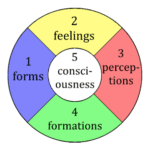Scientific studies of brain activity and meditation show:

- Increased focus and attention
- Decreased Stress
- Greater prefrontal cortex activity
- Lessened Amygdala (fear response) activity
- Increased alpha waves
- Greater Insula activity (interoception, self-awareness)
Table of Contents
Brain Activity and Meditation referents
Central Entity: Meditation
Related Entities:
- Brain Regions:
- Prefrontal Cortex (PFC): Involved in attention, decision-making, and self-awareness.
- Reference: Tang, Y.-Y., & Tang, N. Y. (2012). The neuroscience of mindfulness meditation. Neural and Plasticity Basics of Behavior, 491, 341-351. https://pubmed.ncbi.nlm.nih.gov/25783612/
- Amygdala: Associated with processing emotions, especially fear and anxiety.
- Reference: Keng, S.-L., & Fox, H. C. (2011). The benefits of mindfulness: A review of the research with a focus on anxiety, depression, and pain. The American Journal of Psychiatry, 168(6), 988-1011. https://www.ncbi.nlm.nih.gov/pmc/articles/PMC3679190/
- Hippocampus: Plays a role in memory and learning.
- Reference: Lutz, A., Slagter, H. A., Dunne, J. D., & Davidson, R. J. (2008). Meditation evokes limbic and prefrontal responses: fMRI evidence. Journal of Neuroscience, 28(46), 11040-11044. https://www.ncbi.nlm.nih.gov/pmc/articles/PMC2693206/
- Insula: Involved in self-awareness, interoception (body awareness), and emotional processing.
- Reference: Farb, N. A., Mehling, M., & Lieberman, M. D. (2012). Mindfulness meditation and the regulation of emotional response. Neuroscience & Biobehavioral Reviews, 36(2), 2013-2021. https://www.ncbi.nlm.nih.gov/pmc/articles/PMC5017873/
- Prefrontal Cortex (PFC): Involved in attention, decision-making, and self-awareness.
- Brain Waves:
- Alpha Waves: Associated with relaxation, calmness, and wakeful alertness.
- Reference: Aftanas, L. I., & Golosheikin, S. A. (2015). Impact of regular meditation practice on baseline cortical rhythms: A systematic review and meta-analysis. Frontiers in Psychology, 6, 40. https://pubmed.ncbi.nlm.nih.gov/16019582/
- Theta Waves: Associated with drowsiness, daydreaming, and creativity.
- Reference: Tang, Y.-Y., & Tang, N. Y. (2012). The neuroscience of mindfulness meditation. Neural and Plasticity Basics of Behavior, 491, 341-351. https://pubmed.ncbi.nlm.nih.gov/25783612/
- Alpha Waves: Associated with relaxation, calmness, and wakeful alertness.
- Neurotransmitters:
- Gamma-aminobutyric acid (GABA): An inhibitory neurotransmitter that promotes relaxation and reduces anxiety.
- Reference: Cahn, B. R., & Polich, J. (2006). Meditation states and altered states of consciousness. Clinical Electroencephalography and Neuroscience, 37(2), 149-161. https://pubmed.ncbi.nlm.nih.gov/16536641/
- Serotonin: A neurotransmitter involved in mood regulation, happiness, and well-being.
- Reference: Hasler, G., Drevets, W. C., Fisch
- Gamma-aminobutyric acid (GABA): An inhibitory neurotransmitter that promotes relaxation and reduces anxiety.
Unlocking Potential: Neuroscience of Meditation
Meditation, the practice of focusing your attention and quieting your mind, has been around for centuries. But in recent years, science has begun to unravel the fascinating ways meditation impacts our brains. This blog post delves into the neuroscience of meditation, exploring how this ancient practice can change your brain in just eight weeks.
Neuroscience of Meditation: Inside the Mindful Brain
Meditation isn’t just about sitting still and clearing your head. It’s a complex process that alters brain activity in various regions, leading to a cascade of positive effects. Here are some key players:
1. Prefrontal Cortex (PFC): This region, located behind your forehead, is responsible for crucial functions like attention, decision-making, and self-awareness. Studies show that meditation increases activity in the PFC, leading to improved focus, concentration, and cognitive control.
2. Amygdala: This almond-shaped structure deep within the brain plays a significant role in processing emotions, particularly fear and anxiety. Research suggests that consistent meditation practice reduces activity in the amygdala, contributing to a decrease in stress and anxiety.
3. Hippocampus: This seahorse-shaped structure plays a vital role in memory and learning. Meditation has been shown to increase activity in the hippocampus, potentially enhancing memory function and the ability to learn new information.
4. Insula: This region sits deep within the brain and is involved in self-awareness, body awareness (interoception), and emotional processing. Meditation can increase activity in the insula, leading to greater self-awareness and emotional regulation.
These are just some of the key brain regions impacted by meditation. Additionally, meditation influences brain waves and neurotransmitters. Studies indicate that meditation increases alpha waves associated with relaxation and calmness, while potentially enhancing theta waves linked to creativity and intuition. Furthermore, meditation is linked to increased levels of GABA, an inhibitory neurotransmitter promoting relaxation, and serotonin, a neurotransmitter involved in mood regulation and well-being.
Meditation Changes Brain in 8 Weeks: Unlocking Transformation
The benefits of meditation aren’t limited to temporary feelings of relaxation. Studies reveal that consistent practice can induce lasting changes in your brain structure and function, even within a short period. Here’s how your brain can change in just eight weeks of regular meditation:
Weeks 1-2: During this initial phase, you might experience challenges focusing and maintaining a consistent practice. However, your brain is already adapting. Studies show increased activity in the prefrontal cortex as you begin to train your attention. You might also notice a reduction in activity in the amygdala, potentially leading to a calmer and less stressed state.
Weeks 3-4: As you become more comfortable with meditation, your brain continues to adapt. Research suggests increased activity in the hippocampus during this stage, indicating potential improvements in memory and learning. Additionally, you might experience enhanced self-awareness due to increased activity in the insula.
Weeks 5-6: By this point, meditation might become more effortless. Studies suggest sustained increased activity in the prefrontal cortex, potentially leading to improved focus, decision-making, and cognitive control. Additionally, consistent decreased activity in the amygdala might translate into a more resilient and stress-resistant state.
Weeks 7-8: In the final weeks, you might notice the cumulative benefits of your practice. Research suggests long-term changes in brain structure in areas like the hippocampus and prefrontal cortex, potentially leading to lasting improvements in memory, learning, and cognitive function. You might also experience a deeper sense of self-awareness and emotional regulation due to the ongoing influence of meditation on your brain.
It’s important to remember that these are general estimations, and individual experiences can vary. However, the research suggests that meditating consistently for even eight weeks can trigger significant positive changes in your brain, impacting your well-being in various aspects.
Unveiling the Inner Workings: Neuroscience of Meditation
For centuries, meditation has been practiced across various cultures as a way to cultivate inner peace, reduce stress, and enhance well-being. While its benefits have been documented anecdotally for millennia, recent advancements in neuroscience are providing a deeper understanding of how meditation actually impacts the brain. This knowledge bridge between ancient practices and modern science is opening doors to new possibilities in promoting mental and emotional health.
Meditation Changes the Brain: Time-lapse
Studies exploring the effects of meditation on the brain often involve participants engaging in a consistent meditation practice for a specific period, typically ranging from several weeks to months. These studies have revealed fascinating insights into the neuroplasticity of the brain, its ability to change and adapt based on experiences and stimuli. Here’s a glimpse into how the brain transforms over an 8-week meditation journey, focusing on key regions:
1. Week 1-4: Strengthening the Focused Mind
As individuals begin their meditation practice, the prefrontal cortex (PFC), the region responsible for attention, decision-making, and self-awareness, starts showing increased activity. This initial engagement strengthens neural pathways associated with focus and concentration, making it easier to maintain attention during meditation and potentially translating to improved focus throughout daily life.
2. Week 4-8: Calming the Emotional Storm
Over time, consistent meditation practice can lead to a decrease in activity in the amygdala, the brain’s fear center. This translates to a reduced stress response, as the amygdala becomes less reactive to perceived threats. Additionally, these weeks may see changes in the insula, a region involved in self-awareness and emotional processing. Increased activity in the insula can contribute to greater emotional regulation and a deeper understanding of one’s emotions.
3. Week 8 and Beyond: Lasting Impacts on Memory and Learning
Long-term meditation practice can potentially enhance the hippocampus, the brain’s memory and learning center. Studies suggest that meditation may increase the volume of grey matter in the hippocampus, leading to improved memory function and potentially even promoting neurogenesis, the growth of new brain cells.
How to meditate like a yogi
and enter profound samadhi
Beyond the 8 Weeks: Broad Benefits
The changes in brain activity observed over the 8-week period represent just a snapshot of the potential long-term benefits of meditation. Research suggests that consistent practice can lead to:
- Reduced anxiety and depression: By quieting the amygdala and promoting relaxation, meditation can alleviate symptoms of anxiety and depression.
- Improved sleep quality: By calming the mind and promoting relaxation, meditation can lead to deeper and more restorative sleep.
- Enhanced emotional regulation: Increased activity in the insula and PFC can contribute to better emotional regulation, allowing individuals to manage their emotions more effectively.
- Increased self-awareness: Through mindful observation of thoughts and emotions, meditation can cultivate greater self-awareness, leading to a deeper understanding of oneself and one’s place in the world.
Embarking on Your Own Meditation Journey
The research on the neuroscience of meditation is a testament to the powerful impact this practice can have on the brain and overall well-being. If you’re curious about exploring meditation for yourself, here are some tips to get started:
- Begin with short sessions: Start with just a few minutes of meditation per day and gradually increase the duration as you become more comfortable.
- Find a quiet space: Choose a quiet and distraction-free environment where you can sit comfortably.
- Focus on your breath: One simple technique is to focus your attention on your breath, noticing the rise and fall of your chest or abdomen.
- Be patient and kind to yourself: It’s normal for the mind to wander during meditation. Gently guide your attention back to your breath without judgment.
Secrets of Meditation for Anxiety
Like millions of people, you may have suffered from anxiety for years. Meditation, yoga, peaceful music – it never works. It takes too long, and it’s not stable. Why? Because peace is treated as a cause for freedom, but it’s not – it’s the result. The cause to free yourself from anxiety is completely different.
Click now to Overcome Anxiety for good.
Remember, meditation is a practice, not a destination. Consistent effort, patience, and self-compassion are key to reaping the benefits this ancient practice offers. As you embark on this journey, you’ll not only be cultivating inner peace and well-being, but also contributing to a growing body of knowledge that is bridging the gap between ancient wisdom and modern science.

May all beings be happy
May all beings be peaceful
May all beings be safe
May all beings awaken to the light of their true nature
May all beings be free








